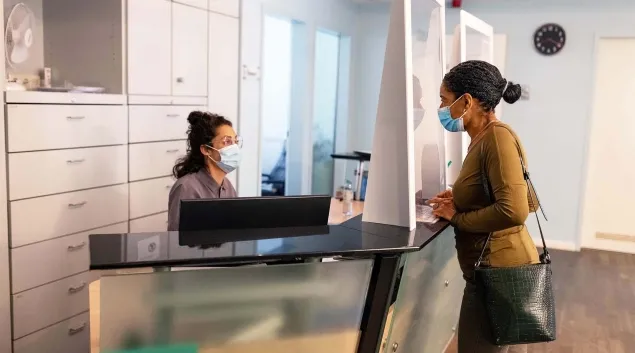
Photo: Luis Alvarez/Getty Images
The time required to schedule a physician appointment in 15 major metropolitan areas has increased by 19% since 2022 and by 48% since 2004, according to a new survey conducted by AMN Healthcare.
It now takes an average of 31 days to schedule a physician appointment in 15 of the largest metropolitan areas in the U.S., the survey found. That's an increase from 26 days in 2022, the last year the survey was conducted, and from 21 days in 2004, the survey's first year.
Longer physician appointment wait times are an indicator that the U.S. is experiencing a growing shortage of physicians, the survey said.
WHAT'S THE IMPACT
The survey tracked average new patient physician appointment wait times in six specialties: obstetrics/gynecology, cardiology, orthopedic surgery, dermatology, gastroenterology and family medicine.
Obstetrics/gynecology wait times clocked in at 42 days, up 33% since 2022 and up 79% since 2004. Dermatology hit 36.5 days, up 6% since 2022 and up 50% since 2004.
Wait times for cardiology were at 33 days, up 23% from 2022 and up 74% since 2004, while family medicine wait times stood at 23.5 days, up 14% since 2022 and up 16% since 2009, the first year that family medicine was included in the survey. Orthopedic surgery wait times averaged 12 days, down 29% since 2022 and down 29% since 2004.
Gastroenterology saw an average wait time of 40 days. It was added to the survey just this year.
Average physician appointment wait times for all specialties vary by metropolitan area. Boston has the longest average physician appointment wait time at 65 days, while Atlanta has the shortest at 12 days.
Physician appointment wait times can vary widely depending on the specialty and metropolitan area. Wait times can range from as short as one day to as long as 291 days for a dermatology appointment in Portland, Oregon, as long as 231 days for an obstetrics/gynecology appointment in Boston, as long as 208 days for a gastroenterology appointment in Detroit, and as long as 175 days for a cardiology appointment in Washington, D.C.
THE LARGER TREND
The survey also indicates that 82% of physicians in the 15 major metropolitan markets accept Medicare as a form of payment. Boston has the highest number of physicians accepting Medicare at 94%, while Atlanta has the lowest at 68%.
By contrast, only 53% of physicians in the 15 metropolitan areas accept Medicaid as a form of payment. Detroit has the highest number of physicians accepting Medicaid at 85%, while New York has the lowest at 28%.
The survey includes data from 1,391 physician offices located in 15 metropolitan areas, including Atlanta, Boston, Dallas, Denver, Detroit, Houston, Los Angeles, Miami, Minnesota, New York City, Philadelphia, Portland (Oregon), San Diego, Seattle and Washington D.C.
Jeff Lagasse is editor of Healthcare Finance News.
Email: jlagasse@himss.org
Healthcare Finance News is a HIMSS Media publication.